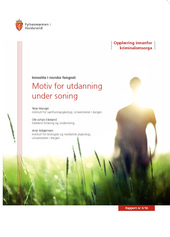| dc.description.abstract | The right of education during incarceration is regulated by international conventions and recommendations. Membership nations of the UN and the Council of Europe are committed to implement the agreements and recommendations they have assented to. Norway has incorporated the European Convention on Human Rights into her legal system, and a fundamental principle of the Norwegian prison system is that prisoners should have the same access to social services as other citizens. To obtain a knowledge base for the assessment of the educational requirements of the Norwegian prison population a survey was conducted to examine prisoners’ educational background and employment experience, educational participation, educational preferences and motives. The study was carried out one week in May 2009 in all Norwegian prisons. Data were collected by a questionnaire. According to reports from the Norwegian Ministry of Justice, there were a total of 3 359 prisoners during the time period in question. Some of them (estimated to 3.6 per cent) were on leave or otherwise occupied, and could not be reached. Of the 3 238 prisoners who received the questionnaire, 63.7 per cent (2 065) answered and returned it. Prisoners who were not confident in Norwegian were also given an English version, and those who could not understand either of the languages or those having reading or writing problems, received help to fill out the questionnaire. The questionnaires were returned anonymously. The study was approved by the Regional Ethical Committee for Research in Health Sciences of the Western Norway and the Privacy Ombudsman for Research, Norway. In addition, a special approval was granted from the prison authorities and the Ministry of Justice, Norway. Prisoners born in 95 different countries participated in the study, and 33.5 per cent of those who replied were born in other countries than Norway. Women accounted for 6.0 per cent of the prison population when data was collected, but 7.4 per cent in the study population. The respondents' average age was 34.7 years. In their choice of education, prisoners can be moved by causes that are relatively independently of their awareness. Alternatively they might act purposely in accordance with their intentions. The aim of the part of the survey that is presented in this report was to examine prisoners’ educational motives, and an educational motives questionnaire was used for the purpose. The subjects were presented with 15 possible reasons for starting an educational program in prison. They were asked to indicate how important each of these reasons is for them. Of those who answered this particular part of the questionnaire 750 already participated in prison education and 867 did not. Three single reasons were the most important for starting an education, both among those who already had started and those who had not: "To spend my time doing something sensible and useful", "To make it easier to get a job after release", and "To learn about a subject". Younger prisoners were more likely than older prisoners to say that social reasons, such as to meet friends there, were most important, but reasons linked to preparation for life upon release were also often mentioned as important. There was no clear difference between prisoners with low and high education in scores on reasons having to do to with the preparation for life after release, but in addition the first group more often ticked boxes for social reasons. Prisoners with long sentences (more than five years) were more likely than those with shorter sentences to state that an education is useful after release and also an opportunity to acquire knowledge and skills. The study also showed that prisoners with learning problems were more likely than others to say that social reasons are important, but they also regarded education as good for self-esteem and prevention of future crime. The 15 items of the educational motive questionnaire were factor analyzed. Three motive categories were identified: "To prepare for life upon release" (Factor 1), "Social reasons and reasons unique to the prison context" (Factor 2), and "To acquire knowledge and skills" (Factor 3). Factor 1 explained more than double of the variance than the sum of the other factors, and educational level was not related to scores on this first factor. The same factor structure was revealed for those who had started an education in prison, and the first factor explained more than one third of the variance than the sum of the two other factors. For those who not attended school or education two motive categories were identified: "To prepare for life upon release" and "Social reasons and reasons unique to the prison context". The first factor explained more than four times as much of the variance as the second. Factor 3 is a significant predictor for taking up an education in prison, and both this factor and Factor 1 are significant predictors for wishing to start an education in prison. | en_US |
